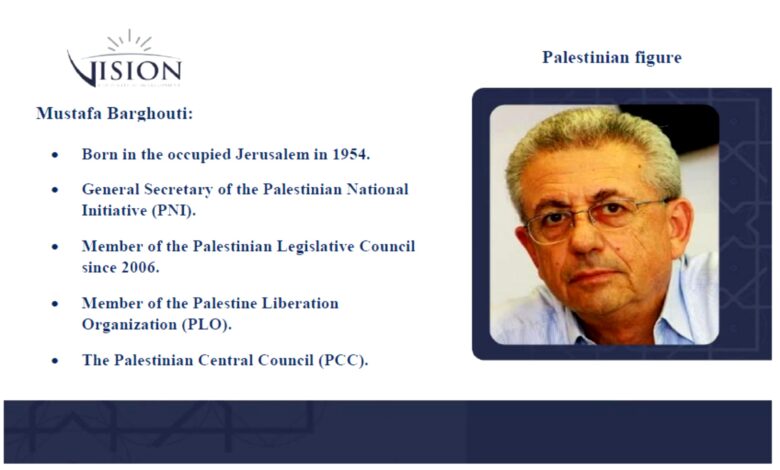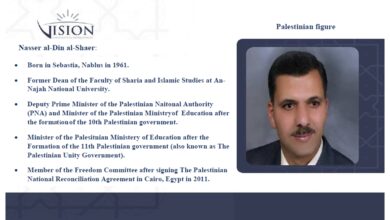Mustafa Barghouti:

Mustafa Barghouti
Mustafa Kamal Barghouti was born on January 15, 1954 in the occupied Jerusalem. His family is originally from Deir Ghassana, a Palestinian town located in the northwest of Ramallah. He is married, with one child. He received his elementary and primary education at the schools of Al-Bireh city, and he received his secondary education, in the scientific stream, at Al-Bireh Secondary School and graduated from it in 1971. In 1978, he earned a bachelor’s degree in medicine from The Peoples’ Friendship University in Moscow, Russia. He also holds a second bachelor’s degree in Philosophy from the same university. He holds a master’s degree in Management Information Systems from Stanford University in California, United States. Between 1978 and 1988, he worked as a doctor at Al-Makassed Hospital in Jerusalem. Between 1989 and 2005, he was assigned as the director of the Health, Development, Information and Policy Institute (HDIP). In 2007, he was elected to be the Minister and the spokesperson of The Ministry of Information of Palestine.
Barghouti started becoming interested in national issues while he was a college student. He participated in the events organized by the Student Activism; he was a leftist. He was elected as the president of student council at The Peoples’ Friendship University in Moscow, Russia. In 1978, he joined The Palestine Communist Party. He cooperated with other communists to establish the Palestinian Medical Relief Society, which has reinforced his position and prestige. Moreover, he was a delegate to the Madrid Conference of 1991, which was held with the aim of ending the Israeli–Palestinian conflict. He was a member of the Multilateral Steering Committee during Israeli-Palestinian peace talks. He was nominated in the election of 1996 to be the Speaker of the Legislative Council. However, he stepped down this post for a Christian candidate pursuant to the quota laws. In 2002, he resigned from the communist party; with the cooperation of Haidar Abdel-Shafi and Ibrahim Dakkak., he founded the Palestinian National Initiative (PNI) and became its leader.
In 2002, Barghouti contributed to founding and managing al-Rased News in order to reach and influence public opinion. In 2005, he was nominated for the presidential elections; he received 20% of the total votes. He obtained the Legislative Council membership after winning the legislative elections of 2006. He also contributed in founding the Palestinian Non-Governmental Organizations Network (PNGOET). In addition, he is a member of several academic institutions, and others, such as: THE Palestinian Institute for the Study of Democracy (Muwatin) and The Arab American University in Jenin. He has several publications in the West Bank and the Gaza Strip in the field of health and social works, and he has written a book called ‘Steadfastness on the Mountain – for Freedom and Democracy’.
Barghouti believes that the Palestinian case is in a critical situation right now. This is due to the constant attempts of the Israeli occupation to prevent the establishment of an independent Palestine. As a consequence, coming up with any fair solution for both sides is impossible. He also believes the reason behind the division between Palestinian political parties is because of the absence of true democracy. He also considers that the Oslo Accords brought nor real neither just solution, leaving no other chance for the Israeli occupation but to end its occupation right now. This is the only solution to establish a free and an independent State of Palestine. As for resistance, Barghouti believes that popular resistance is the only valid solution which will help in achieving what past Palestinian resistance movements failed to. This will create great changes, especially in terms of unifying Palestinians. He also believes that the power of Palestinians steadfastness creates heavy pressures on the occupier. Barghouti considers that political partnership is a fundamental component: to form a Government of National Unity and to form fair legislative and presidential elections. He finally concludes that this can only be achieved when all parties harmonize in accordance with the PLO vision and mission.


